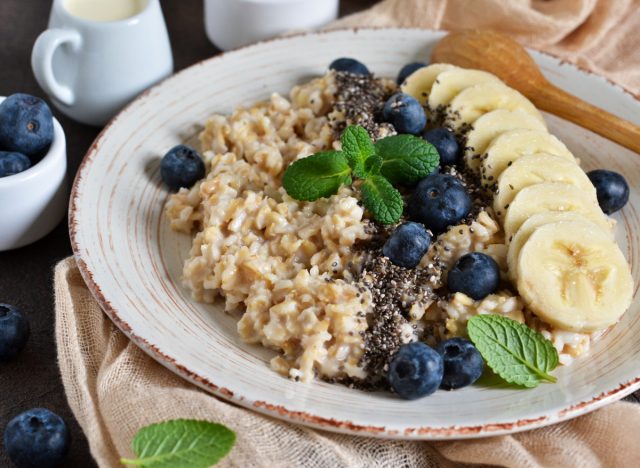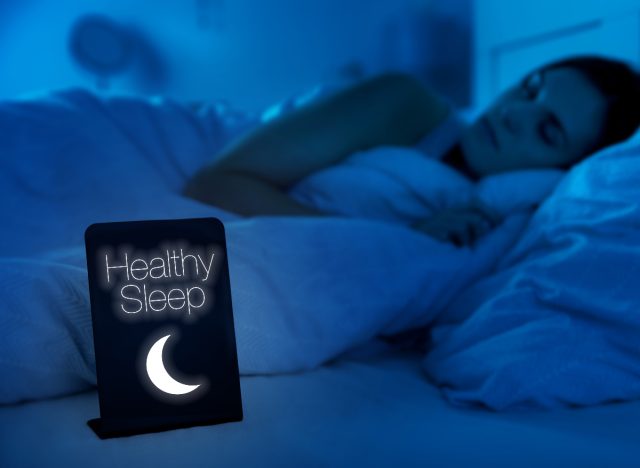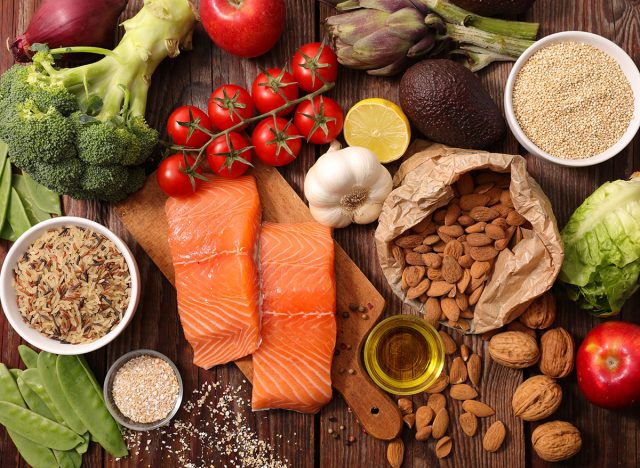Adopt This 30-Day ‘Healthy Habits’ Challenge for a Full-Body Transformation

We’ve all been there: The New Year rolls around, and you become filled with hopes and dreams of finally making healthy lifestyle changes. But with the dawn of a new year just around the corner, why wait until January to get healthy? According to a 2020 study in PLOS One, only 55% of responders who make New Year’s resolutions to get healthy actually succeed in reaching their goals. So why not start today? In this article, we challenge you to commit to upgrading your habits for the next 30 days to transform your body just in time for the holidays.
We spoke with health experts Destini Moody, RDN, CSSD, LD, a registered dietitian and sports dietitian with Garage Gym Reviews, and Michael Masi, CPT, a certified personal trainer at Garage Gym Reviews, who serve up the best lifestyle habits for you to overhaul your fitness, health, and body from the inside out.
When it comes to your health and well-being, there are no shortcuts, and we’re not promising overnight miracles. Instead, we’re offering a roadmap to help you make real, sustainable changes to your lifestyle. These habits will not just help you drop a few pounds but also improve your mood, boost your energy levels, and revitalize your entire outlook on life.
Read on for the 30-day challenge to transform your body, and after you’re done, learn more about the 6 Best ‘Anxiety Superfoods’ To Eat When You’re Feeling Stressed.
Start the day with a solid breakfast.

Kicking off your day with a healthy, hearty breakfast can give you the energy you need, reduce mid-morning cravings, and help maintain a healthy metabolism. In addition, research shows that those who eat breakfast tend to consume less sugar than those who skip breakfast.
“If you’ve ever found yourself feeling hungry late in the afternoon after lunch or late in the evening after dinner, it’s probably because you skipped breakfast,” says Moody. “Not only can eating breakfast help keep hunger at bay and manage food intake, but it kickstarts your metabolism and gives your brain enough fuel to have a focused, energetic, and productive day.”
Eat smart when dining out.

Dining out doesn’t have to sabotage your healthy habits. When you’re at a restaurant, opt for lighter menu items, control portion sizes, and ask for dressings and sauces on the side to keep your nutrition goals on track.
“Eating meal prep 24/7 isn’t realistic, at least if you want a social life. So, it’s good to make smart choices when you go out to eat. This doesn’t mean always ordering a salad when you’re at a steakhouse because that’s just no fun, but making your meal balanced and healthy,” explains Moody.
Get quality sleep.

It’s no secret that quality sleep is essential for physical and mental well-being, affecting several aspects of your health, from cognitive performance to mood and energy levels. To set yourself up for success, develop a consistent sleep schedule, create a calming bedtime routine, and make your sleeping environment comfortable to ensure you get the rest you need.
“Sleep deprivation has recently been associated with an increased risk of chronic diseases,” cautions Moody. “Sleeping six hours or less per night has also been shown to increase ghrelin, the body’s hunger hormone. People who sleep less also tend to eat more and experience more sweet cravings due to the brain’s search for fuel. Shoot for eight to 10 hours of continuous sleep every night, even if that means going to bed earlier.”
Manage stress effectively.

According to a study in the International Journal of Health Sciences, chronic stress can lead to myriad health conditions, including neurological disorders, headaches, heart issues, ulcers, diabetes, asthma, rapid aging, and even early mortality. That’s why it’s essential to incorporate stress-reduction techniques like meditation, deep breathing, or regular exercise to keep stress in check and promote a healthier lifestyle.
“Stress is perceived by the body as a trauma response, releasing doses of adrenaline as if the body was in danger,” explains Moody. “When the body is in this state for too long, such as during prolonged stress, it can cause inflammation and cognitive stress. To manage stress, go for a walk, watch a comforting movie, do some yoga, or whatever works for you to manage stress healthily.”
Remove distractions while eating.

Eliminate distractions like smartphones and TV shows when you’re eating so you can focus on your meal and your body’s hunger and fullness cues. A 2019 review concluded that mindful eating can improve digestion, increase self-acceptance, and boost mind-body-food awareness.
Moody tells us, “Eating while distracted is not the best idea for controlling how much you eat, especially if you’re trying to manage intake while on a diet. Furthermore, it may not be best to eat while you’re typing away at your desk or in meetings, as the brain can fail to make the connection that you’re eating if it’s busy and distracted by too many other stimuli. Taking the time to focus on the flavor, texture, and enjoyment of your meal can also improve your relationship with food.”
Create a wind-down routine.

A relaxing bedtime routine helps signal to your body that it’s time to unwind. Consider doing some reading, gentle stretching, or taking a warm bath to prepare your mind and body for restorative sleep.
“A wind-down routine can significantly enhance the quality of your sleep and overall well-being,” states Masi. “Initiate the process by dimming lights about one hour before bedtime. This is an indicator for the body to begin its wind-down phase. A structured bedtime routine may lead to improved sleep quality and reduced sleep onset time, both crucial for physical and mental rejuvenation. Regular sleep patterns have also been associated with lowered stress levels, reduced risks of mental health disorders like depression and anxiety, enhanced cognitive functions, and bolstered physical health.”
Engage in regular physical activity.

Everyone knows regular exercise is a pillar of healthy living. The Centers for Disease Control and Prevention (CDC) states that physical activity can improve your brain health, boost your bone and muscle strength, aid in weight management, lower chronic disease risk, and enhance your quality of life. Find physical activities you enjoy, whether it’s a daily walk, a dance class, or hitting the gym. The key is to keep moving.
“Our bodies are adaptive machines. If you expose your body to physical stressors, you’ll undergo adaptations over time that build resilience. This means improved cardiovascular health, improved body composition, enhanced mood via the regular release of endorphins, and decreased risk for chronic diseases like diabetes and obesity,” explains Masi.
Eat a well-balanced diet.

Ensure you’re consuming a wide variety of fruits, veggies, lean proteins, and whole grains to provide the nutrients your body needs for optimal function. According to the National Institutes of Health, eating a healthy, well-rounded diet can reduce your risk of obesity, diabetes, heart disease, and other chronic health conditions.
“Establishing a balanced diet is a great healthy habit that will increase the chances of getting enough protein, fiber, vitamins, and minerals,” says Masi. “A balanced diet means a large majority of your calories come from fruits, vegetables, whole grains, lean meats, and healthy fats. This habit reduces the risk of nutrient deficiencies, supports organ function, boosts immune health, and helps maintain an optimal weight.”
- Source: https://www.ncbi.nlm.nih.gov/pmc/articles/PMC7725288/
- Source: https://www.ncbi.nlm.nih.gov/pmc/articles/PMC5986439/
- Source: https://newsinhealth.nih.gov/2021/04/good-sleep-good-health
- Source: https://www.ncbi.nlm.nih.gov/pmc/articles/PMC6196958/
- Source: https://www.ncbi.nlm.nih.gov/pmc/articles/PMC4791152/
- Source: https://www.ncbi.nlm.nih.gov/pmc/articles/PMC7219460/
- Source: https://www.apa.org/news/press/releases/stress/2013/sleep
- Source: https://www.sleepfoundation.org/mental-health
- Source: https://newsinhealth.nih.gov/2018/12/plan-your-plate









